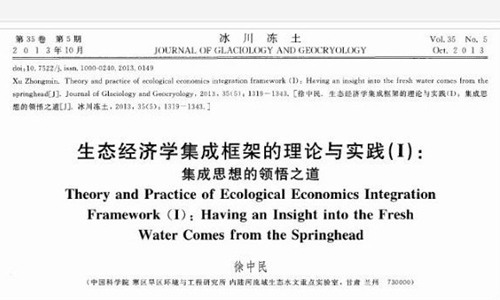HOME >> CHINA
Academy questioned over biased paper suspected of abusing research funds
By Leng Shumei and Wan Lin Source:Global Times Published: 2020/1/13 19:38:40

Title of the controversial journal article Photo: web
Academic misconduct became a hot topic on Chinese social media again after media revealed a researcher's controversial paper, in which the author fawned his mentor's sublime and the mentor's wife's beauty, leading netizens to express disappointment with the national academy and questioned their use of funds."My mentor, his mind is as broad and peaceful as the sea… he stands high and looks down at the world, showing a noble simplicity and solemn greatness…" read a paper published in 2013 on the Chinese Journal Glaciology and Geocryology.
The paper, written by Xu Zhongmin, a research fellow at the Cold and Arid Regions Environmental and Engineering Research Institute under the Chinese Academy of Sciences (CAS), was recently shown on social media, sparking criticism as netizens called it "ridiculous" and a "shame on the academic community."
The major parts of the paper were about the "glorious" deeds and "loving" stories of his mentor Cheng Guodong, a CAS academician, and Cheng's wife, arguing that the aim of life is a "combination of the beautiful and sublime," except for the introduction, which covers some academic concepts.
In response to the criticism, Xu denied on Monday that he was fawnning his mentor in the paper to get more funds, claiming that the paper was based on previous high-quality research and contained deep meaning.
The mentor's story is only one of the examples he used to support his mutual development road theory, Xu said, noting that he had written other papers to explain the theory.
Cheng is also the journal's editor-in-chief, which had retracted the paper on Sunday and apologized for loose review.
The CAS Northwest Institute of Eco-Environment and Resources, which manages the journal, also announced on its website on Sunday that they had accepted the editor-in-chief's resignation and suspended a deputy editor.
The paper was reportedly one of the five results of a project sponsored by the National Natural Science Foundation of China, with a fund of 2 million yuan ($290,000).
"Usually, academic publishers should hire an anonymous expert to review before deciding to accept a paper. But the step would be skipped if the paper's writer has personal relations with the publisher," a doctoral student at Peking University told the Global Times on Monday on the condition of anonymity.
Xu's paper was probably accepted without a third-party review for his relations with the editor-in-chief, the student said, noting that the situation is common at many Chinese journals.
Chinese netizens expressed strong disappointment with national institutes' academy level and called for a further investigation to determine if there was any abuse of national funds in the case.
"Even the CAS is like this, how good could other colleges be? Enhanced management is urgently needed, starting from the teachers!" a netizen said on China's Twitter-like Sina Weibo.
Some also accused the paper of promoting female stereotypes as some sections of the paper praised the mentor's wife for preparing cooking meals for her husband as an obligation, and said lacking talent is a virtue of a woman.
Xu did not respond to this topic as of Monday.
Controversy over Xu's paper erupted about a month after the Communist Party of China's disciplinary watchdog announced it would take aim at a so-called academic paper that claims excessive activity and disorder of the gut flora DNA system may be a biological cause of humans' corrupt activities.
"It is far from enough for the journal to simply withdraw Xu's article. The investigation must continue to see if there were underground exchanges of benefits, either involving money or affiliation," Ren Jianming, an associate director of Research Center for anti-corruption and governance at Tsinghua University, told Global Times on Monday.
"Speaking from my own experience of reviewing and evaluating research projects, I have seen projects that don't have the output worth the state funds they receive," Ren said.
Ren called for enhanced management of academic institutes to prevent violations.
Ministry of Education officials stressed zero tolerance for academic misconduct and vowed firm action in indentifying and investigating such acts in February 2019 after Zhai Tianlin, a Chinese actor who earned a Ph.D. from the Beijing Film Academy, was caught cheating on his thesis, which shocked Chinese society and caused many universities to strengthen their review of theses in 2019.
Newspaper headline: Academy questioned over biased paper
Posted in: SOCIETY,CHINA FOCUS